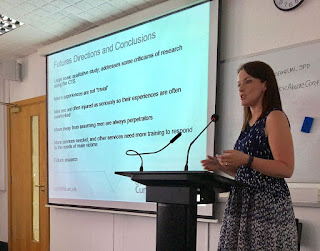Being an Early Career Academic and Work-Life Balance
 |
| Philippa Laskey |
As someone who has worked
in academia for two and half years, I consider myself to be an early career
researcher, or more appropriately, an early career academic. I make the
distinction because the term early career researcher implies my job only
includes research. Research is a big part of my working life, but my job also
involves teaching and student support. Being at the beginning of my academic
career, I face the challenge of balancing career progression with a need to
maintain a healthy work-life balance.
Impostor Syndrome
One issue that seems to
plague all academics early on in their career, which can have a damaging effect
on work-life balance, is impostor syndrome. This is the belief that you don’t
belong in academia, and that you’re not skilled enough to survive. The constant
fear is that you’re about to be found out, and asked to leave and never come
back! I started my academic career as a non-traditional undergraduate student
at the age of 24, so I have always felt to a certain extent that I didn’t
belong. One recent event which really solidified my impostor syndrome, was the
first time I presented at a national conference (see picture below). Everyone
seemed so much more intelligent and confident than me!
 |
| Philippa Laskey presenting at the 2016 BPS Division of Forensic Psychology Conference in Brighton |
However, even the most
established academics have impostor syndrome and I wonder if it comes from
having a job where success is measured in such an individual way. Because of
this individuality, when academics come to compare themselves against their
peers, it’s no surprise that they can feel inferior or that they haven’t
achieved enough. To anyone who feels they have impostor syndrome (students,
academics, humans) the advice is not to compare yourself to others. I try to do
this by looking back at everything I have achieved, rather than looking at what
others have achieved. The success of others is very unlikely to affect your own
career and professional development!
Work-Life
Balance
With such a tendency to
be preoccupied with success and what others are doing, it can be difficult to
keep a healthy work-life balance. It can feel like your only option is to work
all the hours in the day to achieve your goals. While this can work in the short-term,
it isn’t sustainable. Like anyone else, it’s important that early career
academics are mindful of their physical and mental well-being. I have only
recently come to the realisation that to achieve my goals effectively, I need
to take time off to relax and spend time with my family and friends. This
realisation only happened because I am currently in my second year of a PhD.
When I first started, I tried to fit in my research whenever I had some free
time, but this eventually led to me losing enthusiasm for my PhD through
overwork. Finally, I realised that as an undergraduate and masters student I
had always worked best when I dedicated a full day every week to my work. So, I
thought, surely that will work for a PhD as well? So far so good! However, I
don’t have the answer to maintaining a good work-life balance for everyone, but
I suppose that finding what works for you, while at the same time not striving
for perfection in everything, is a good start.
Moving
Forward
It can be difficult being
an early career academic; between trying to develop yourself professionally,
and not doing more work than your job role allows, it’s a fine balancing act.
However, by constantly chipping away at career goals bit by bit, you are
progressing but without jeopardising your mental and physical well-being. It can
be challenging, but I believe that academics have to stop comparing themselves
to others, and hopefully what will follow is a greater chance of maintaining a
healthy work-life balance.
Philippa Laskey is our psychology Research and Teaching Assistant. If you'd like to get in touch with her then you can email her on: Philippa.Laskey@cumbria.ac.uk
You can also find her on Twitter: @PhilippaLaskey


Comments
Post a Comment